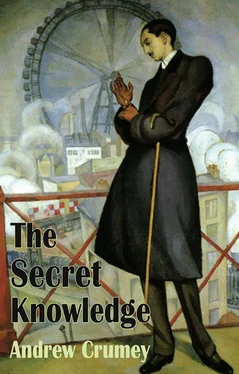In Lisbon she read Walter’s writings, copied and discussed them, above all his essay ‘On The Concept Of History’, a work he must have considered a kind of testament. There the mechanical Turk serves as metaphor for historical materialism, a theory supposedly able to demonstrate, despite all contrary evidence, that humanity is progressing towards a better state. Free the captive hunchback, Walter seemed to be saying, discard the ridiculous machine; yet nine months ago he was beaten by it. He thought he could enter Spain without a French exit visa; other refugees had done it before, unmolested. But on just that day, the one he chose for his escape, the rules were different. On the chessboard the king lies toppled while the automaton withdraws its triumphant arm, the expression on its face unaltered.
Theodor Adorno comes in, short and bald, even uglier than she remembers, with his big dark eyes and upper-bourgeois air of entitlement some women supposedly find attractive. He looks surprised. “You?”
“Didn’t the secretary tell you I was here?”
“She said there was a Frau Blücher to see me, I didn’t realise it was you.”
Names these days have become as fluid as nationalities; the dark-suited scholar who scrutinises her so circumspectly used to be called Wiesengrund until he dropped his father’s surname, blatant as a yellow star, replacing it with the more attractive Italian one that had been his mother’s. Hannah will never forgive him for that; her excuse is the more conventional one of recent remarriage, previously she was Frau Stern. They are both in their mid-thirties yet Wiesengrund-Adorno has the manner of an elder statesman puffed up by surroundings he considers prestigious: surplus floor-space on the campus of Columbia University. He looks at her with eyes devoid of desire; Hannah knows how philosophers make love and how they express contempt, explaining either as the fruit of reason. She sees his curiosity drawn exclusively towards the folder of documents on her lap. She explains their origin.
“We should go to my office.”
The state of emergency that grips the world is not the exception but the rule: following Adorno along the corridor is little different from appearing at the consulate in order to be assessed for survival by a bland functionary who tells everyone not to take it personally. Humanity is superseded by the reconfiguration of paperwork meant to replicate it, by rules that must be followed, the rules of an artificial second nature. Walter Benjamin was to have been saved by some headed notepaper the Institute sent him, showing his own name among the listed members. Hannah Arendt’s passport has been her political activism; a stipend from the Zionist Organization of America pays for the room she and her husband have rented on West 95th Street, where the landlady is a vegetarian bird-watching hiker who forbids smoking. In Europe that would make her a fascist; in America things are different, apparently.
Teddie Adorno goes to sit behind his desk while Hannah Arendt perches on the chair facing him, crossing her legs beneath the precious folder. Is this how she seduced Heidegger, he wonders, while for Hannah it is another round in the chess match. Walter told her to bring the papers to Adorno because he was the one man likely to publish them. It was Hannah whom Walter trusted as a genuine friend; she is witness and bearer of the legacy.
“I have something you should see,” Adorno tells her. From the drawer of his desk he brings out a battered correspondence box stuffed with letters and retrieves a creased postcard, sliding it across the table into Hannah’s view. She stares at the neat French script.
In a situation without escape, I have no other choice but to finish it all. It is in a little village in the Pyrenees where no one knows me that my life must end.
She’s heard already, of course, how Walter and his companions were detained in a hotel where Walter apparently took an overdose of his own heart medicine. But not this final message.
I ask you to pass on my thoughts to my friend Adorno and to explain to him the situation in which I have found myself. There is no more time for me to write all the letters I would have wished to write.
She is astonished, also instinctively doubtful. “This is not Walter’s hand.”
“He wrote the message for Henny Gurland who was with him in Portbou. She thought it best to memorise and destroy it, then wrote this copy once she was safe.”
Terror heightens and perfects the faculty of memory; the most exact antithesis to thought is unlimited freedom of writing, eliminating its value in the same way alchemists feared the easy manufacture of gold would render their discovery futile. Teddie watches her re-read the postcard and can imagine it the centrepiece of a Hollywood dramatisation, sentimental history vignetted to the accompaniment of violins. She’s never liked him, not since his criticism of her first husband’s work on the philosophy of music. She’s no longer even married to the man but still bears the grudge. Somehow, Adorno thinks, Frau Blücher cannot appreciate the dialectic of memoration and forgetfulness.
“Now you should read this,” she says, leaning forward to place the folder on his desk.
“Later, of course.”
“The first piece is rather short, I should like to hear your thoughts.”
She watches as he opens the folder and lifts the uppermost item, ‘On The Concept of History’. The story of an automaton rigged to win every game: the theory of progress. Walter had been trying to write a book about nineteenth-century Paris but there were only voluminous notes, disconnected sketches; material the self-styled Institute for Social Research could never use since it failed to conform to their or anyone else’s prefabricated system. Walter’s was the sort of mind the Nazis would have delighted in liquidating.
Adorno’s initial perusal is a swift assessment of names and references; to Hannah he looks, with his glasses perched on his broad bald forehead, like someone marking an end-of-term paper. Lines from Brecht bear testimony to the unfortunate delinquency of Benjamin’s thought, his willingness to embrace shock, populism, mysticism. Each numbered section a mere paragraph or two, a general deficiency of analysis and rigour, one describes a painting Adorno knows, Klee’s Angelus Novus . Walter owned it, paid a thousand marks for it. The angel is the figure of history, looking retrospectively at chaos and disaster: we are blown backwards into the future by a tempest. This is the painting that will later come to Adorno, rolled in a cardboard tube, just like the postcard and the essay he will not publish, an act that Arendt will publicly condemn. Already the years are filled with nowness from the end of time.
“This is remarkable,” Adorno murmurs after a while. “He has clarified so much of what we discussed.”
Envy, Benjamin writes, is something we feel most strongly, not towards what was or will be, but with regard to what might have been. “People we could have talked to, women who could have given themselves to us.” His suicide note, if genuine, appears to express this envy most starkly: “all the letters I would have wished to write.” In an introduction that Arendt will provide for a collection of his essays published in 1968, she will liken Benjamin to his own description of Kafka: “once he was certain of eventual failure, everything worked out for him.” Alike too, though, in their apparent unenviousness, a purity of vision evoking the austere generosity of universal friendship without specific object, a quality sometimes termed saintliness. Benjamin’s final sentence would then express unregretful humility: words that need never be said. History is ultimately redemptive.
But what of the world the rest of us inhabit: the world of envy? Then it no longer matters what was, is, or will be, but rather what could have been, what might be. In a world driven by envy, history becomes the multiple image of its alternatives, a condition inextricably linked with pastiche. To escape is impossible, to ignore is to surrender; Adorno is sufficiently unfree of envy to appreciate his deceased colleague’s insight.
Читать дальше











